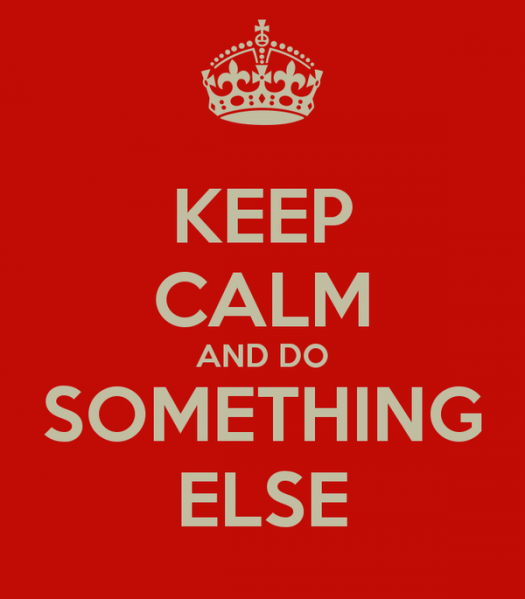What to Do When Your Creativity Hits The Wall
By Tracy Hahn-Burkett | January 31, 2018 |

Trying to solve a problem in your manuscript and you just can’t figure it out? Just say you don’t care and move on to something else.
Yes, really. Stay with me on this one. Let’s say you’ve been working on a problem in your manuscript for hours, days, months, or a lifetime in dog years. You’re trying to write a new piece of it, or you’re trying to solve an old problem in a new way, or you’re working on any scene that requires some creativity on your part. But you’re tired. It’s draft 37 and you’re burned out. You don’t really care how the love interest dies anymore; you just know he needs to be dead in a way that gets to the next plot point and isn’t inconsistent with three other conditions already set up in the rest of the story. Frankly, if you could make him appear to you in the flesh for a moment, you’d hone one of your chewed-up pencils to a super-sharp point and just do the deed yourself. That would feel so good right now.
But that’s not how this works. Now, you’re seasoned enough to know that you can’t wait for your muse to show up before you start to write, so you sit down in your chair, lift your fingers to the keyboard, but…nothing. You can’t figure out the problem. You eat chocolate, and…nothing. You drink copious amounts of coffee. Nothing (except an urgent need to pee). You stare out the window, walk the dog, clean the house… All the usual prescriptions for jogging a writer’s brain add up to you being no closer to accessing the necessary creativity than you were at the beginning of this effort.
So give up. Turn your attention to writing something else.
I’ve discovered that sometimes, when I’m having trouble working through a problem or a scene, I can jog my writing brain into action by metaphorically walking away from my problematic manuscript and instead writing in the form with which I began my writing journey: essays or essay-type blog posts. I’ve written over a thousand of these—albeit of varying quality. When I sit in front of a blank screen with the intention of filling it with non-fiction discussion and detail, I know I’m beginning something I can finish because I’ve literally done it a thousand times before.
So I draft a short, non-fiction page or two. When I’m done, I read what’s in front of me, and I see a structure I recognize. I see problems that need fixing, language that works in some places but makes me cringe in others. I see exactly what I expect to see: a first draft. Because hey, I can do this. I can write. If I want to do something with the piece I’ve just written, I’ll begin revising. If not, no worries. It was just an exercise. Either way, I’ve accomplished my mission. I’ve given myself a shot of confidence, and I know that I can apply this confidence to working on my novel.
Another way to remind yourself of your storytelling ability is to play a game. (Access to a kid or another writer makes this more socially acceptable in public, but it’s not a requirement.) Pick a random moment and a detail and start spinning, orally, just for fun. I began doing this one morning when I was speaking to middle-school kids about writing to show them how you can make a story out of anything: a kid’s shirt, an earring, a mark on the floor. Sometimes I do it when watching the news with my family; I pull out the occasional “What if…?” and take it on a detailed journey. In every case, I invent elaborate details, relationships and twists that will never make it to a page but do amuse or disturb or intrigue. It’s fun. There’s no pressure. The kids laugh. And I’m reminded that what I’m doing is just writing in the air.
Sometimes the more you focus on something, the harder it is to find it. It’s like looking out at the night sky and seeing a particularly bright star in your peripheral vision that then becomes faint when you try to look at it directly. You need to turn away and figure out another way to approach it. If you really want to see the star, you’ll need a telescope. With a problem in your manuscript, your telescope can be an exercise that pulls your creativity in close while removing peripheral distractions like fear, competing elements of your story, critiques, etc. Exercising your creativity “muscles” will remind you that yes, you are capable, and your block is just stage fright.
So don’t keep beating up on yourself if you’re blocked. Declare indifference and write something else. Then you can get back to your manuscript and throw out creative solutions until you find one that works.
[coffee]










About three years ago I came up with a great idea. The idea came while we were vacationing in San Diego. When we returned to Oregon I could not wait to write it. I wrote the first draft in about two months. 300 plus pages. 80,000 plus words. Proud as can be. I had a bad feeling about one major thing but I ignored it. How bad could it be, right? When I took it to my writer’s group they highlighted that one major thing causing the story to crash.
The problem: The protagonist was boring. Nobody cared.
The side characters were great, they told me. The story idea was great but the one we were suppose to root for wasn’t.
After numerous attempts to figure this guy out I shelved it. About a month ago I began to figure this guy out. I started reading a book on character development and as of today I am on my way to creating a character that a reader can care about.
Long story short: Walk away and forget about it. For a while anyway.
Bryan, that’s great. Really! I truly believe stories can benefit tremendously from fresh eyes–yours and others’–after sitting alone for a while, and your process is proof. Congratulations on recognizing the good critique and developing your protagonist accordingly.
I like Orson Scott Card’s take on this: “Writer’s block is never solved by forcing oneself to ‘write through it,’ because you haven’t solved the problem that caused your unconscious mind to rebel against the story, so it still won’t work – for you or for the reader.”
I find sometimes just writing about writer’s block can break it open. Writing down problem, the fears, the worries, gets it out of the mind and heart. And then a long walk among the trees followed by a single glass of wine.
Paula, that makes a lot of sense. Walks are outstanding for clearing the head. We writers spend so much time sitting on our butts that it’s easy to neglect our bodies’ requirement that we move around.
As for wine: I’ve tried writing mixed with a glass, and it just doesn’t work for me. I get gobbledygook. But I know it works for many others, so à votre santé!
I take walks, wash dishes, work in the garden. That’s what helps my creative wheels get moving.
Hi Liz. :)
This is your version of walking away, then coming back. I love it.
When I have a problem with a character–can’t figure out what he/she should do next or how he/she should handle a problem, I pretend to BE that character and write a letter or a journal entry AS that character. Sometimes that allows me to get a sense of what’s going on in the character’s mind, which helps me figure out where to go next.
Nancy, that’s a great approach. Anything you can do to get inside your characters’ heads or let them into yours can help break a block. (Although I caution you, if it works really well, you may find re-entry into the real world a bit jarring and your family members may become a bit annoyed. I’m speaking theoretically, of course…)
Oh gosh, this came at the exact moment I needed it. For me I take walks, wash dishes and tidy and (at the moment) listen to Schubert’s chamber music. It settles my mind. I am in final stage revisions and just can’t see things at times. Thanks SO MUCH!!
Glad I could help, Stephanie. Classical music can be so calming, and I don’t know why I don’t remember that more often. So thank YOU for that reminder!
Thanks for the advice! As I said on Twitter, the “shot of confidence” technique is something I’m trying out this year, by writing just-for-fun, no-stakes-or-intentions flash fiction. For me, writing is a lot about momentum, and “muscle,” so I need to keep up a good rhythm in whatever way possible. I have to keep stretching and working out the muscle. But when I fixate on a project I’ve gotten stuck on, my momentum totally dies, and my muscle weakens, which then perpetuates my inability to get over the hurdle.
Kristan, I’m totally with you on the concept of momentum. It’s taken me a long time to accept that when I’ve been away from my manuscript for a long time, I’m just going to have to write garbage for a while before I write anything good. It’s just as bad as getting stuck.
No wonder we need various techniques to get ourselves back on track. We have so many ways we go off the rails! I hope you’re having fun with your flash fiction.
I don’t relate well to hit the wall problems. When I start a project I seldom get stumped while writing because I plot and plan, and work out issues before I get into it. If I have problems with a chapter or scene, I just skip over it and go to another scene out of sequence that I’ve planned to write. Story structure is everything, knowing it makes the book write its self. The best book I’ve read on this is Larry Brooks’ book Story Engineering. I don’t know the guy but his book did wonders for me and it might prevent others from hitting the creative wall. Deb Dixon’s book, Goal, Motivation and Conflict, is also a game changer.